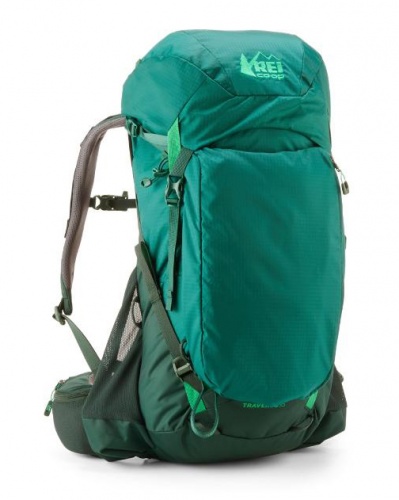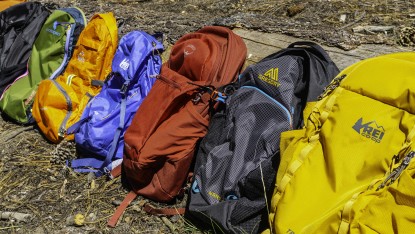REI Co-op Traverse 35 Review
Our Verdict
Our Analysis and Test Results
The REI Co-op Traverse 35 was the pack we reached for most when going out to play in the mountains. With loads ranging from 5 to 45 lbs, it hugged our hips and back and kept things stable without restricting our range of motion. We gave two Editors' Choice awards this year: one for the most versatile small daypack, and the other for the best daypack for heavy loads, which the Traverse took handily. We see the Traverse 35 as being the ultimate quiver-killer of a backpack. We happily used it for easy day hiking, bushwhacking, scrambling, mountaineering, snowshoeing, and even lightweight backpacking. If you only want a single daypack, look no further.
The Traverse competes most directly with other burly, feature-rich packs that prioritize convenience and comfort over range of motion or moving fast. It pulls no punches in design to be an easy to use and comfortable pack. However, if you're looking for a lighter, smaller pack for shorter or more dynamic endeavors, like climbing, mountain biking, or trail running, consider packs with softer frames, lighter fabrics, and lower carrying capacities.
Comfort
This was the most comfortable and stable pack we tested. The wire mesh frame and contoured hip belt hug the torso, and the shoulder straps are just padded enough — not so thick as to pinch or restrict movement, but just wide enough to distribute load across the upper torso.
While the ventilation isn't as effective as other suspended mesh back panels, it allows decent airflow and strikes a balance between insulating properties that can be beneficial for winter hikes and allowing evaporation during warm weather pursuits. This also keeps the load closer to your back for more stability than more ventilated models.
The Traverse really shines in awkward movements with a moderate to heavy load. We pushed this pack to the limit, from bushwhacking and scrambling in New Zealand to low angle ice in the Washington Cascades. Throughout, its uplift compression straps held the load tightly against the back and minimized sideways or vertical motion, making for a very stable load that moved seamlessly with our body, instead of resisting against it. On day hikes, this stability translated to being able to comfortably run down trails without the load bouncing and throwing off cadence.
Unlike other mesh suspended frame packs, the traverse has a relatively stiff, contoured hip belt that, while it can be warm, hugs the hips better than most other large daypacks. While this makes it heavier than some other packs, the ventilation and comfort seem worth it when you finish a long day with little to no soreness in the shoulders or back.
One notable drawback to the Traverse's suspension is a lack of adjustability. The torso length only comes in two sizes. We tested the large size on a range of torso sizes and found no issues with fit, but a good fit is essential to a comfortable carry, so be sure to try this pack on before committing to it.
Weight-to-Volume Ratio
The Traverse strikes a good middle ground in terms of weight, with a weight to volume ratio of 1.11 (oz/L). While it's on the heavier side for a daypack, it can hold 48 L of gear spread out across all its various pockets (39 L in just the main compartment). The Traverse uses a recycled 200 denier nylon for most of its body, with a recycled 400 denier nylon Oxford cloth for the bottom. These materials balance durability and lightweight, without getting into the more expensive side of the materials spectrum.
The Traverse creatively eliminates a few zippers common to other packs to save weight. For instance, instead of a dedicated pocket and zipper for the rain cover, the rain cover on the Traverse can be held in a mesh pouch underneath the lid, where it also dries out faster than in a closed pocket. REI also eschewed a few common straps (e.g., bottom compression straps), and has instead provided small loops onto which one could sew or girth-hitch straps if needed. This enables the Traverse to come in at a low weight for its volume and allows you to tack on whatever accessory straps you find necessary to carry a typical load.
Versatility
We enjoyed loading up the Traverse 35 for scrambling, hiking, snowshoeing, backpacking, short day trips, and even as a carry on for plane travel. The load-carrying system can handle anything you throw at it. We found that snowshoes fit well either along the sides of the pack (for wider snowshoes), in the outer flap (for thinner snowshoes), or under the top lid. We carried avalanche gear (probe, shovel), snowshoes, a glacier ice axe, microspikes, poles, and even a rock pick with this pack, many of those all at once.
While we would hesitate to climb, bike, or commute with this pack, it is ideal for any endeavor that involves being mainly on two feet most of the day. While it performed well on steep snow and even fourth class scrambling, with plenty of neck mobility and unrestricting shoulder straps, we recommend mountaineering-specific packs for alpine climbing endeavors.
Unlike soft-framed packs, the Traverse doesn't easily allow you to easily bend or arch your back, or twist at the hips. This is the trade-off for being able to carry heavy loads comfortably and makes this pack less-than-ideal for activities like mountain biking or scrambling, where lots of torso motion is necessary.
Ease of Use
This pack is feature-rich but doesn't include the whole kitchen sink. We like this balance. The loops on the bottom and sides of the pack enable you to add all the straps you desire for carrying bulky objects like packrafts or foam sleeping pads. The side mesh water bottle pockets are cavernous and have a creative button-closure to adjust their size. They work equally well for storing an avalanche probe for a day of backcountry skiing as well as soft or hard-sided water bottles.
We especially liked the hose routing and small sternum-strap hose clip on this pack. After a day of use, we could retrieve our hose, drink, and then tightly secure it back on the shoulder strap without even looking down.
The features on the Traverse work well together. The outer pocket sits above the super-effective uplift compression straps, allowing you to fill it with light items (like gloves or thin layers) that can be easily accessed while the main compartment is secured. The arrangement of the ice axe loop, top pole/axe attachments, outer stuff pocket, and lid are all such that you can store items on the outside of the pack, then either tuck them under the lid or run them through small loops on the lid buckles to keep them even more secure.
The included rain cover was the best of all included rain covers, including cords that loop over the hip belt and a midway strap to secure the cover to the bag. This allows for just the top of the rain cover to be removed for access without disturbing its fit across the rest of the bag. This rain cover is least likely to inadvertently come off during a bushwhack, and it performed well in our rain testing.
While the ice axe loop is annoyingly high, it also works well for storing poles. It's easy to tie on a loop of webbing on one of the bottom loops of the pack for a lower ice axe carry, if you prefer. We thought the uplift straps would get in the way for storing things like snowshoes or poles, but found instead that they function just as well as similar bottom compression straps on other packs, and the outside attachment points are well-positioned for holding a variety of gear.
Durability
We have years of experience with packs made from very similar materials to the Traverse 35 that hold up to abuse very well. The lack of zippers and overall design simplicity make this pack easy to repair and unlikely to fail. On top of that durability, the Traverse is made of bluesign® approved recycled nylon. We all need to do our part to reduce plastic waste, and it's an excellent sign that major gear manufacturers are trying to be a little more sustainable.
The mesh back panel does tend to take in a lot of pine needles and other brush when bushwhacking, and is a point of concern for potential failure. However, we feel this is worth it considering the ventilation a mesh panel provides.
On top of using this pack in snow and rain, we also sprayed it down with a hose (much more intense than a typical rainstorm) to see how it resisted water. The rain cover performs well, even when the pack is full. The top-loader design means that even without the rain cover (for example, if you are carrying snowshoes), the main compartment will stay dry longer than most panel-loading packs, which don't have as much fabric covering up the main compartment. Compared to this pack, panel-loaders wetted out much faster by letting water in through their zippers.
Value
REI consistently offers decent gear for reasonable prices, and the Traverse ups this trend by being an exceptional piece of gear for a very reasonable price. Given the years of design-experience that must have gone into this pack, it's surprising that it doesn't cost more.
Conclusion
The Traverse 35 handily took Editors' Choice in this round of reviews. It can capably handle any sort of load, it's adaptable to many sports, and can carry day trip gear in any season. If you need a large daypack for your typical outdoor pursuits, you likely can't go wrong with this pack.












